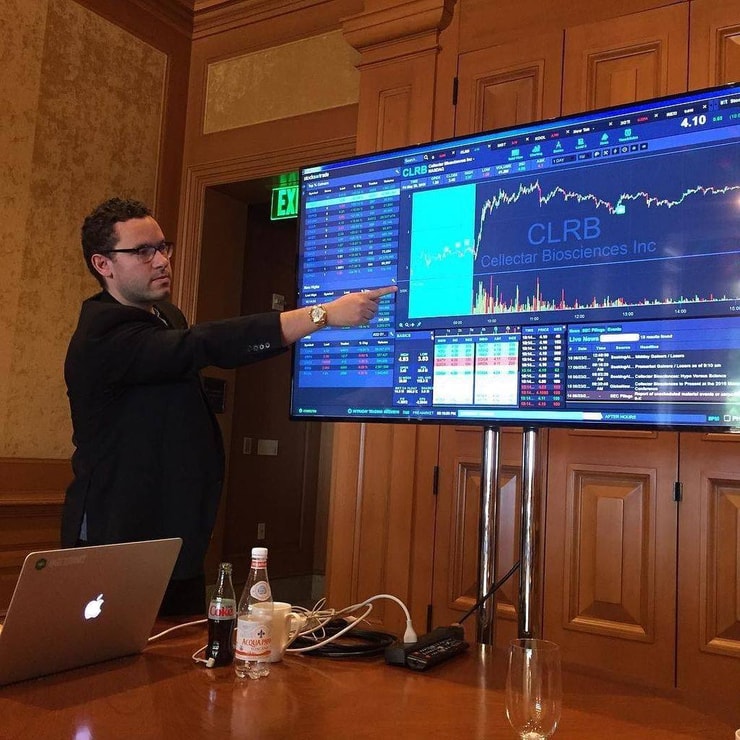Just saying you’re going to trade smarter and be more disciplined isn’t enough to change the tide.
After all, everyone who trades wants to make money.
Yet few do.
Why?
Short answer: they lack discipline.
I know, not a popular opinion, but the truth stings.
The best traders I know didn’t achieve their success randomly…
They followed a process and stuck to a set of rules.
After $7.4 million in trading profits and mentoring more than 30 of my students and helping them on their millionaire journey…I have developed a set of rules that have delivered some incredible results.
If you’re struggling right now it’s probably because you aren’t following your rules.
Or even worse…you don’t have a good set of rules to follow.
Here are my top ten trading rules…
Table of Contents
#1 Cut Losses Quickly

I have not been trading well at all this year. Yet, I’m still profitable.
Why?
Because I’ve mainly stuck true to my number one rule and that’s cut losses quickly.
Emotions and ego often make it difficult to follow this rule, but it’s essential to minimize losses as much as possible.
#2 Get Out Of Bad Trades
Admitting your wrong is not always easy. Sometimes as traders we can get stubborn. Instead of taking a small loss we hang on and hope for the trade to reverse. Or even worse, we add to the losing position, increasing our risk exposure.
More Breaking News
- The Soaring Heights and Bumpy Lows of SoundHound AI: Unraveling December’s Financial Narrative
- Expand Energy Corporation Stock Faces Turbulent Waters: What’s Next for Investors?
- Bitfarms Faces Challenges: Navigating Recent Drops and Leadership Changes
That’s why it’s essential to get out of bad trades once you discover you’re in one.
#3 Small Gains Add Up
For someone to make $100,000 a year in the stock market they would have to average $400 in daily profits.
I made over $1 million in 2020 and I did it again in 2021, primarily trading small. Don’t get seduced by all the fake traders on social media who only post their winning trades.
You don’t need to swing for the fences to make a lot of money in the stock market. Small wins add up.
That’s why it’s important to focus on the process early on in your journey.
#4 Trading Isn’t Easy

Don’t expect to get rich quickly when you start. Many of my top students didn’t make a penny their first year. Jack Kellogg who has made over $12.5 million in the last two and a half years lost money his first year.
It takes countless hours of studying, discipline and screen time to succeed.
#5 Learn What Works For You
My bread and butter is trading OTC penny stocks.
I have proven results trading them and it works for me.
However, it might not work for you.
And that’s what makes my coaching program so unique…
I don’t teach my students to trade like me, I teach them a process, and show them how to find their own way.
I’m proud that two of my students have surpassed me in trading profits. It helps prove my point that I’m a better teacher than trader.
Try different things out and when you find something that works for you…study hard to master it.
#6 Patterns Repeat

Become a student of the game. Patterns and trends repeat in the market. Experienced traders recognize these patterns and use them to their advantage.
Take the time to study what’s worked in the past…it may do so again in the future.
By the way, this is one of my favorite patterns.
#7 Keep A Trading Journal
I have placed thousands of trades throughout my career.
There’s a lot of valuable information and lessons from those trades.
Keeping a detailed trading journal to track my progress, learn from my mistakes, and develop go-to patterns and strategies helped me out immensely.
If you’re not tracking your trades, taking notes on your trading, then you’re doing yourself a major disservice.
I like to track all my trades on Profit.ly.
#8 Work From Anywhere

One of the benefits of trading is that you can do it from anywhere.
Trading is not location-dependent.
Go out and enjoy your life…don’t be a slave to your screens.
#9 Focus On The Process
Like I said, many of my best students struggled in year one and two. However, their goals were process oriented and not money oriented.
If you focus on making money early on then you’ll likely be discouraged from your results and probably give up.
Instead you want to focus on learning the patterns, catalysts, risk management skills, execution, and everything else that makes someone a good trader.
#10 Focus On Stocks In Play

The best stocks to play tend to be volatile and experiencing above average trading volume.
It’s easy to get chopped up trading penny stocks if you’re trading stuff that isn’t volatile and doesn’t offer a lot of liquidity.
Avoid illiquid stocks.
Stick to stocks that have catalysts, strong patterns, and offer an opportunity to turn a quick profit.
Final Note
My trading rules go far beyond ten…
I just wanted to give you a glimpse at some of the stuff I feel is important. These rules don’t have to be yours…
However, you should develop your own set of rules.
It’s essential if you want to be a disciplined trader.
If you’d like to learn more about my latest training session click here for the details.

Leave a reply